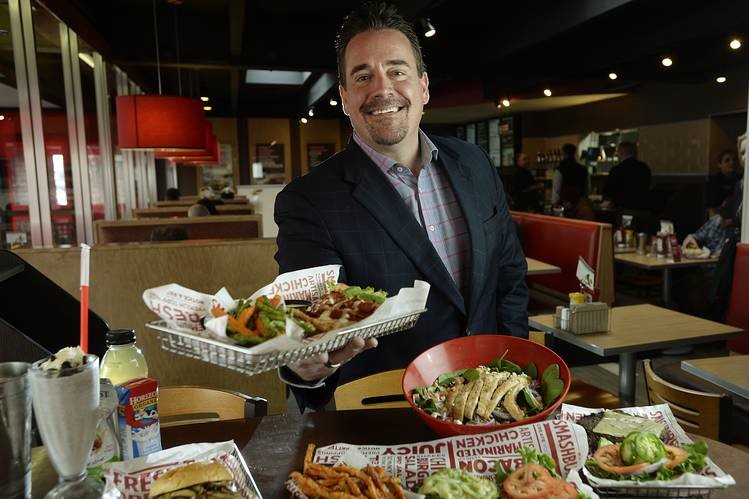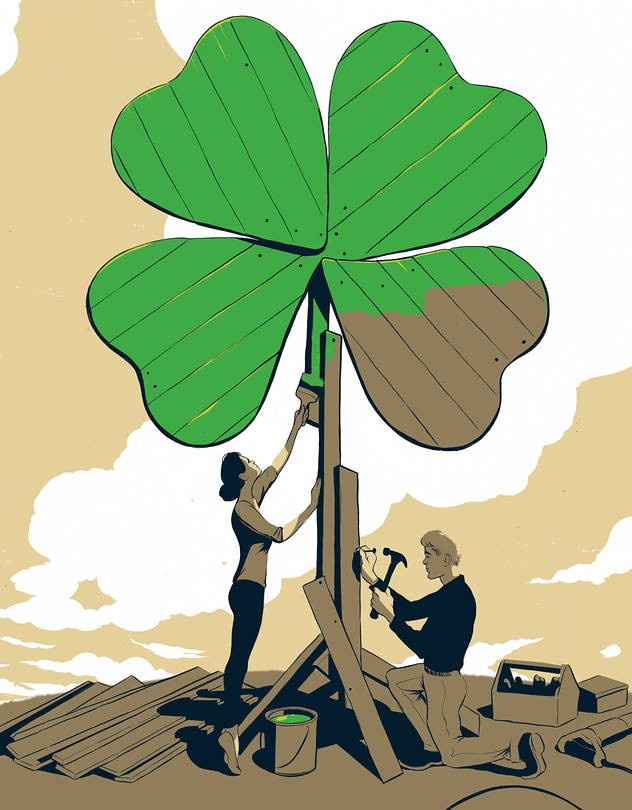
Posts Tagged "Irish"
To Be Successful, Make Your Own Luck
On St. Patrick’s Day everyone wants the Luck of the Irish and to find the Pot of Gold. This article from the Wall Street Journal – March 1st provides some clues to help you have both.
Stories about getting lucky are common in the business world, but attributing success to random chance is misleading. Simple rules to create luck for yourself.
To Be Successful, Make Your Own Luck
By
Janice Kaplan and Barnaby Marsh
March 1, 2018 11:21 a.m. ET WSJ
When Scott Crane became president of the fast-casual restaurant chain Smashburger in 2007, he wanted “to put better burgers into people’s lives,” he told us. It was a smart concept, but according to Mr. Crane, there was another key factor: luck.
The recession of 2008 hit shortly after he took over, and Americans were looking for more value when they dined out. Also, real-estate prices had gone down, so Smashburger was able to expand in a way that wouldn’t have been affordable before. By the time Mr. Crane left the company in 2016, Smashburger had 330 restaurants in seven countries.
Such stories are common in the business world. An executive humbly claims that he was simply in the right place at the right time, took advantage of circumstances and—bam!—became a huge success. But attributing success to random chance is misleading. If you believe that luck will just fall from the sky, you will probably never get lucky.
Luck occurs at the intersection of random chance, talent and hard work. There may not be much you can do about the first part of that equation, but there’s a lot you can do about the other two. People who have a talent for making luck for themselves grab the unexpected opportunities that come along.
The good news is that there’s plenty of luck to go around if you know how to look for it. Some simple rules can help.

Scott Crane of Smashburger (in 2014) says luck was a key factor in his success. PHOTO:CYRUS MCCRIMMON/DENVER POST/GETTY IMAGES
Pay attention. Researchers who study attention and perception distinguish between narrow focus (seeing specifics) and open focus (observing the wider scene). The most important talent anyone who seems lucky possesses is the ability to pay attention on many levels and to notice opportunities.
The psychiatrist, entrepreneur and philanthropist Henry Jarecki made his first fortune in the late 1960s when 25% of the currency in circulation in the U.S. was still backed by silver. The bills said right on them: “Silver payable to the bearer on demand.”
Dr. Jarecki realized that the silver could be worth more than the dollars—so he collected millions of certificates by paying people $1.10 or more for their $1 bills. Converting them to silver and then selling them as silver futures was a complicated, multistep process, but once he got bank financing behind him, he made more than $100 million from the exchanges.
“I can’t figure out why I was one of the very few who figured out a method for transforming the certificates into real silver,” Dr. Jarecki said. “We all had the same bills in our pockets.”
Get off the standard path. Mathematicians who study game theory have concluded that, in highly competitive conditions, the best move is often to be unpredictable. Lucky people are often the outliers who find a path that others missed.
Warner Bros. executive Mike Darnell made his name in the 1990s by championing offbeat specials at Fox such as “Joe Millionaire” and “Temptation Island,” projects that essentially launched reality-TV. The genre was so scorned by the rest of the industry that, when music mogul Simon Fuller came to Hollywood pitching a reality show, Mr. Darnell was one of the few network executives willing to meet with him. Ultimately, he bought the show, “American Idol,” which became one of the most successful programs in television history.
“I was looking for a different lane that would be my own and where I didn’t have to compete with everyone,” he told us. Working in a business where everyone copies each other, he survived and made his own luck by being different.
Change the odds. Random events have an impact on every life and business, but Caltech physicist Leonard Mlodinow told us that randomness is just part of the story. With so many unknown variables knocking around, one of the best ways to improve your luck is to keep taking chances. “You have to keep trying and accepting failure, because the more at-bats you have, the more likely you are to get a hit, no matter what your skill,” he said.
A young entrepreneur named Alex Abelin left his job at Google a few years ago to start a company connecting web designers with the companies who needed them. As a backup, Mr. Abelin also became an adviser to another startup called Liquid WiFi. “I always knew that if one didn’t work, I had an opportunity with the other,” he said.
His own company did well for a few years and got a lot of attention, but eventually he ran out of funding, closed it down and moved full-time to Liquid WiFi. Shortly after, it was purchased by Verizon for a hefty sum. Two chances at bat meant that he didn’t strike out.

Author Lee Child suggests seeing bad luck as an opportunity. PHOTO: JOEL RYAN/INVISION/ASSOCIATED PRESS
Think yourself lucky. Psychologist Martin Seligman of the University of Pennsylvania told us that if he were looking for a lucky person, “the number one ingredient that I’d select for would be optimism.” Early in his career, Dr. Seligman did groundbreaking experiments on learned helplessness, showing that animals put in stressful situations beyond their control eventually stop trying to escape. People also have a tendency to give up and complain when they think they’re victims of bad luck.
“Believing that you have some control over what happens fuels trying,” Dr. Seligman said. “If there’s a potentially good event for me, am I going to seize the opportunity and follow up, or am I going to be passive?”
Difficult moments that seem like bad luck can become part of a happier picture. Best-selling author Lee Child suggests seeing bad luck as a chance that has come your way. He started writing the Jack Reacher thrillers only after he was fired from a television job in the U.K. that he loved. He was angry and frustrated and felt betrayed, but he channeled it all into finding a new opportunity.
When you’re in the midst of a difficult time, you may not immediately see that your bad luck can have a bright side. But a tough situation may shake you out of your complacency and inspire you to take risks that can lead to unexpected good luck.
Most of us act on only a fraction of the luck-making possibilities around us. If you want to become lucky, look for the positive side of any situation. Choose the favorable future you want and then live as if it had already occurred. It’s not mystical—it’s just a way of putting together all the ingredients to make luck happen.
—This essay is adapted from Ms. Kaplan and Mr. Marsh’s new book, “How Luck Happens: Using the Science of Luck to Transform Work, Love and Life,” which will be published next week by Dutton.

 Tim is a Consultant to Business, Government and Not-for-Profits Organizations specializing in innovative and challenging ways for organizations to survive, to thrive and to build their teams.
Tim is a Consultant to Business, Government and Not-for-Profits Organizations specializing in innovative and challenging ways for organizations to survive, to thrive and to build their teams.